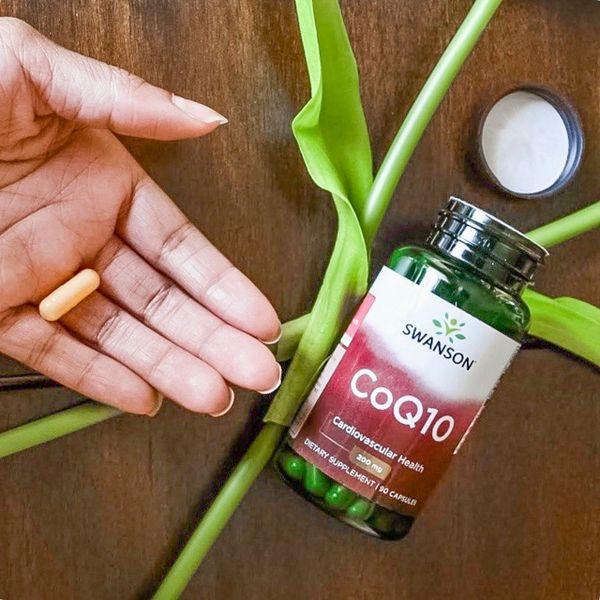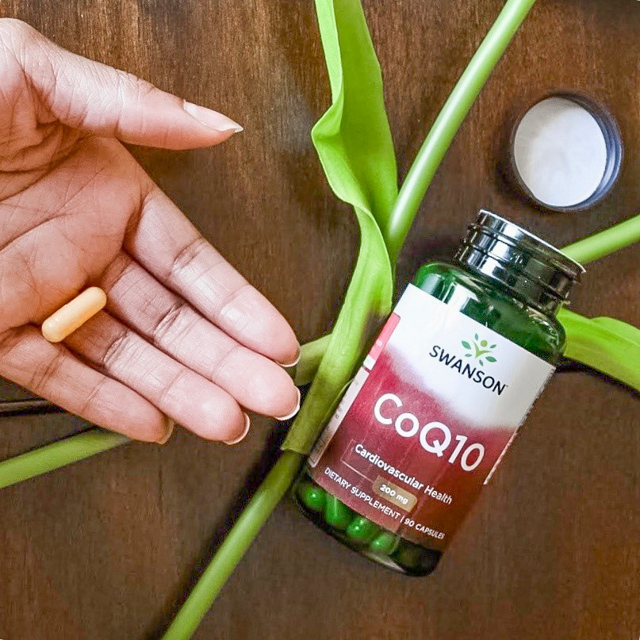Coenzyme Q10 (also known as CoQ10, ubiquinone or ubiquinol) is a naturally occurring compound found in plants, bacteria, animals and humans. As a dietary supplement, it’s most often found in the form of ubiquinone or ubiquinol, the active form your body can immediately put to use. Yet, what is CoQ10? And why does your body need more than it is already making? Let’s take a look.
What is CoQ10?
CoQ10 is classified as an antioxidant. Some sources also refer to it as a vitamin-like nutrient because it’s a critical compound used by every single cell within the body. The reason it isn’t technically a vitamin is simply because the body produces it on its own, unlike vitamin C, for example, which must be obtained from diet.
Your cells use CoQ10 as a source of natural energy. It’s used in the production of adenosine triphosphate, or ATP, the basic form of cellular energy that is needed by cells to grow and stay healthy.1 Thus, CoQ10 is concentrated quite heavily in the organs that require the most energy to carry out their normal tasks. Heart, liver, kidneys and pancreas all must maintain high levels of CoQ10 to function properly.
CoQ10 produced by your body gets stored in the mitochondria, the power plants delivering energy to every cell in your body. Mitochondria also protect cells from oxidative damage.2 CoQ10 itself is a natural antioxidant, and aside from providing a source of energy, its primary role is protecting your body from oxidative damage.
In regards to oxidative damage, we’re talking about free radicals—those unstable molecules that can roam the body causing damage to cells and contribute to aging and other negative effects. Considering CoQ10’s important roles in providing energy to every cell in the body and fending off oxidative stress, it’s no wonder why low levels of CoQ10 have been studied for their potential ties to decreased health.
CoQ10 Supplements: Do You Need Them?
Some foods contain CoQ10, but not in high enough amounts that would provide much benefit to your overall health and wellness. Unlike vitamins, minerals and other essential compounds, you can’t simply improve your diet to increase your CoQ10 intake. This is the number one reason why CoQ10, ubiquinone and ubiquinol supplements are worth a closer look.
The second reason is biological. As you age, your body naturally loses its ability to keep up with your ongoing CoQ10 demand. You still produce it, but not at the same rate as when you were young. Thus, many older adults include CoQ10 as part of their supplement program simply to help fill in this natural gap.
CoQ10 deficiency has also been linked to the following conditions:
- Nutritional deficiencies
- Genetic defects that alter CoQ10 production
- Health challenges draining natural CoQ10 supplies
- Mitochondrial challenges
- Side effects of statin treatments
Like many other dietary supplements, CoQ10 can also play a complementary role to the other supplements you may be taking. For example, CoQ10 may help increase absorption of other essential nutrients, optimizing the effects of these beneficial compounds that are already at work in your body.
CoQ10 Clinical Research Results
According to research findings, CoQ10 supplements might be particularly beneficial for certain areas of health. However, much more research is needed to make definitive recommendations. Nonetheless, CoQ10 is considered safe, with few known or reported side effects, so let’s look at the Mayo Clinic’s brief roundup of the latest CoQ10 findings.3
- Heart health
CoQ10 has been shown to improve heart health. Although findings are mixed, CoQ10 might help support healthy blood pressure. Some research also suggests that when combined with other nutrients, CoQ10 might aid recovery in people who've had challenges related to heart health. - Nervous system health
Early research suggests that high doses of CoQ10 might be beneficial for people concerned about nervous system health and body movement. - Muscle health
Some research suggests that CoQ10 might help ease muscle weakness. - Physical performance
Because CoQ10 is involved in energy production, it's believed that this supplement might improve your physical performance. Research in this area has produced mixed results, however.
Further research surrounding the following potential CoQ10 benefits is still needed, but it’s worth covering all uses to give you the full scope of why a CoQ10 supplement might be suggested.
- Weight loss
We all know exercise is a key component of any long-term weight loss plan, but what if you continually “hit the wall,” as they say? It may be due to excessive oxidative stress stripping your muscles of energy. One of the key benefits of CoQ10 is fighting off such oxidative stress by producing adenosine triphosphate (ATP), which creates energy. In this case, it may also lead to increased muscle performance… and increased exercise performance. - Skin health
Your skin has two big things working against it. First, it’s your body’s largest organ, making it that much harder to keep healthy and resilient. Second, by its very nature, it’s bombarded by all sorts of environmental toxins, including ultraviolet radiation from the sun. Topical CoQ10 creams or lotions can help protect your skin against the environment. - Reproductive health
For women, fertility declines with age just like natural CoQ10 production — and the two are not unrelated. The number and quality of available eggs simply decreases with age, and as the available CoQ10 supply dwindles, those remaining eggs are at greater risk of oxidative damage. Supplemental CoQ10 may support healthy fertility by providing adequate supplies to help fight off the effects of free radicals. Male sperm is also susceptible to such damage, and thus may also benefit from the protective effects of CoQ10.3
CoQ10 Side Effects and Safety
In all the research and studies of CoQ10, no serious side effects or warnings have popped up. The most common minor side effects reported include things like trouble sleeping, dizziness, irritability, headaches, heartburn and general fatigue.1
Despite the relative safety of CoQ10 supplements, women who are either pregnant or breastfeeding should not take them without direction from their doctor or primary healthcare provider. Ultimately, it’s important to consult your doctor before beginning any new dietary supplement regimen.
Swanson offers a variety of CoQ10 supplements and creams. For additional ways to support your heart health and more with essential fatty acids, see Be Fat Fluent: The Best Fatty Foods for Your Diet.

About Amy Sunderman, MS, RD
Director of Science & Innovation, Registered Dietitian, Swanson Health
Amy is a registered dietitian, nutritionist and author with over 17 years of experience in the supplement industry. Amy is passionate about dietary supplements and the health benefits they offer. She enjoys working to find novel nutritional ingredients with strong clinical research behind them to drive innovation and provide health-promoting products to consumers.
Sources
1Coenzyme Q10 (CoQ10): In Depth. National Institutes of Health. https://nccih.nih.gov/health/supplements/coq10 (Accessed 1/5/2018)
29 Benefits of Coenzyme Q10 (CoQ10). Healthline Newsletter. https://www.healthline.com/nutrition/coenzyme-q10 (Accessed 1/5/2018)
3Coenzyme Q10. The Mayo Clinic.https://www.mayoclinic.org/drugs-supplements-coenzyme-q10/art-20362602 (Accessed 1/5/2018)
*These statements have not been evaluated by the Food and Drug Administration. These products are not intended to diagnose, treat, cure or prevent any disease.




